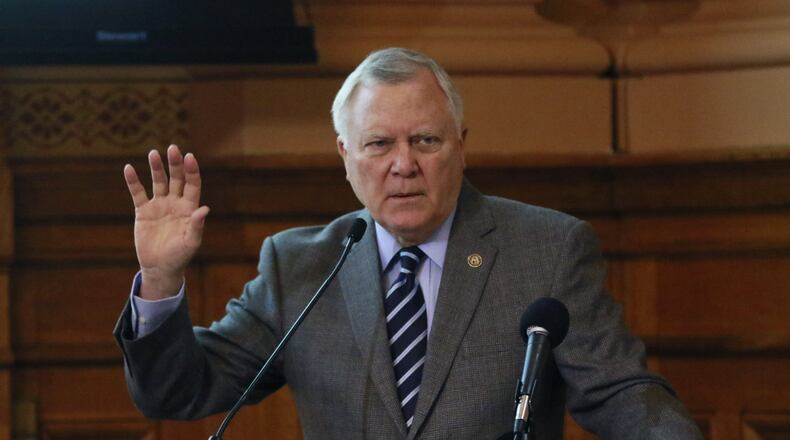Gov. Nathan Deal and the state’s chief economist gave legislative leaders a pretty optimistic financial outlook Tuesday as Georgia begins a new year.
They see continued growth in Georgia's economy, enough, Deal hopes, to continue socking money away in the state's savings account, which now holds about $2 billion.
“We have good news in Georgia,” Deal told legislative leaders as they began hearings on the fiscal 2018 budget this week. “We have brought the state a long way in a relatively short period of time.”
Ken Heaghney, the state’s fiscal economist, said the economy is near full employment and that Georgia added about 99,000 jobs from November 2015 to last November.
He said tax collections are ahead of what’s needed to fund the state budget, with income growing and Georgians spending that money, meaning higher sales tax collections.
“The key components of our economy are growing really well,” Heaghney said.
He told lawmakers that job growth has been highest in Athens, Savannah and Atlanta, while rural areas have lagged. Overall, he said, the state’s job growth is faster than the national average.
But some lawmakers worry that there are a few economic dark clouds on the horizon as the General Assembly prepares to consider Deal’s $25 billion budget plan for fiscal 2018, which begins July 1
"It may look better than it really is," said Senate Appropriations Chairman Jack Hill, R-Reidsville.
Hill said there would have been relatively slow revenue growth in the first half of the fiscal year if it were not for the fuel tax increases approved by lawmakers in 2015.
In his most recent weekly newsletter, Hill called the current rate of growth “alarming” compared with the past few years. The slowdown is particularly seen in individual income tax collections, which are up 2.6 percent from fiscal 2016, a much slower rate of growth than the state has reported in recent years, he said.
Income taxes, the largest source of revenue for the state, were up almost 8 percent last year.
Lawmakers also aren't clear whether changes made in Washington by President-elect Donald Trump and Congress will have an impact on next year's budget. While the spending plan includes $25 billion in state funds, the total budget is closer to $49 billion including federal funding.
Federal money pays for a host of programs, including about two-thirds of what the state spends on health and nursing home care for almost 2 million Georgians.
Lawmakers are just beginning their review of the state budget that Deal proposed. Several department leaders made presentations Tuesday, including new University System of Georgia Chancellor Steve Wrigley. The University System has come under increased scrutiny because of the rising cost of college tuition, and chancellors get asked about the issue by lawmakers each year.
While the Board of Regents doesn’t set tuition until after lawmakers approve the state budget and leave town for the year, Wrigley assured legislators that students won’t see a huge hike next fall.
He said systemwide, tuition has risen on average 2.5 percent annually over the past five years. Wrigley said whatever the Board of Regents approves this year “shouldn’t be out of line with that” average.
“Our intent is to keep any increase low,” he added.
Legislative session coverage
To see more of The Atlanta Journal-Constitution's coverage from the Georgia General Assembly's legislative session, go to http://www.myajc.com/georgia-legislature/. To track particular bills and resolutions, check out the Georgia Legislative Navigator at http://legislativenavigator.myajc.com/. You can also follow the proceedings on Twitter at http://twitter.com/GAPoliticsNews or on Facebook at http://facebook.com/gapoliticsnewsnow.
About the Author
Keep Reading
The Latest
Featured




